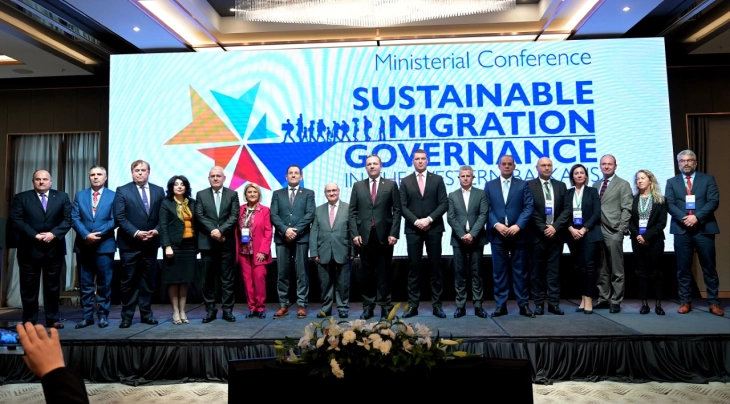Spasovski: Strengthened international cooperation is key to sustainable migration governance in Western Balkans

Skopje, 16 November 2022 (MIA) – A key activity on the path to sustainable migration governance in the Western Balkans is progress in realizing international cross-border cooperation, strengthened international trust and increased exchange of information, which is the best proof of our readiness to make the security environment even more favorable, and thus make progress in European integration even faster, Interior Minister Oliver Spasovski told Wednesday’s press conference held as part of the Ministerial Conference on Sustainable Migration Governance in the Western Balkans.
He pointed out that migration governance is a complex security challenge that the country, as well as the region as a whole, has been facing for a long time because the Balkan Peninsula is part of the migrant routes and sub-routes that lead from Asia and Africa to Central and Western Europe.
“Illegal migrations are a daily topic of discussion and action by police services in our region and in Europe, where the pressure and transit of illegal migration remains high even in 2022, and the crime of migrant smuggling due to demand for criminal services remains attractive and very profitable for criminal groups. The current military and political-security crises in the Near and Middle East and the unfavorable economic and social situation in home countries affect attempts of entry and transit of illegal migrants through our country,” said Spasovski.
The Minister added that for seven years the country has been sharing working experience with foreign police officers on the southern border, through continuous implementation of the international joint operation with the help of the International Organization for Migration (IOM), which includes police officers from eight European countries, seven of which are EU members, with a maximum number of 160 deployed foreign police officers.
Spasovski expressed satisfaction that the Ministry of Interior, together with IOM, within the Czech EU Presidency, is the co-organizer and host of the Ministerial Conference on Sustainable Migration Governance in the Western Balkans.
“The signing of the Agreement between the Republic of North Macedonia and the EU for operational activities carried out by the European Border and Coast Guard Agency in the Republic of North Macedonia, which we are proud to promote over the past month, has more significance for us both at the international and national level. With the ratification of the agreement aimed at unifying forces and strengthened coordination, an opportunity is opened for the deployment of FRONTEX personnel in the country. This will further regulate and specify policies and practices for border protection, which, in turn, will contribute to strengthening the capacities for migration control, particularly illegal ones,” Spasovski stressed.
IOM Director General, António Vitorino, expressed satisfaction on behalf of the Organization with the result achieved at the conference.
“The declaration accepted here between all the representatives of the Western Balkan countries is a commitment to improve cooperation in the direction of combating illegal migration and illegal flows with cross-border crime,” said Vitorino.
He stressed that IOM supports all Western Balkan countries.
“We are a UN Agency for addressing and combating illegal migration and we support all the Western Balkan countries for safe, secure and smooth consolidation of institutions in the fight against illegal migration. We are also ready here to protect the victims of illegal migration, potential victims of their groups and we are committed to helping states in that regard. And we will help the states for better control, exchange of information for better protection of migrants passing through the countries of the Western Balkans,” Vitorino said.
Commenting on the migration crisis that happened three years ago in his country, Minister of Security of Bosnia and Herzegovina, Selmo Cikotić, stressed that with the help of international organizations, they came to a situation that they can easily solve.
“And none of the Western Balkan countries, and of the wider route of the countries, can deal with this problem alone, and this conference confirmed that our joint cooperation is crucial,” Cikotić said.
Montenegrin Interior Minister Filip Adžić pointed out that after Berlin and Tirana, the Ministerial Conference is another chance for everyone to gather together and try to discuss the issues that even much larger countries cannot deal with and find joint solutions for, because individual states cannot solve them independently.
“It is our commitment to connect with the countries of the region and the EU and jointly seek solutions to issues in the region. Our task is to introduce common registration and identification of migrants, so that we can better monitor these movements and cooperate better with the countries of the region,” said Adžić.







